Three Lions: One World Cup, 147 years and 1,000 games - the numbers behind England men's milestone
- Published
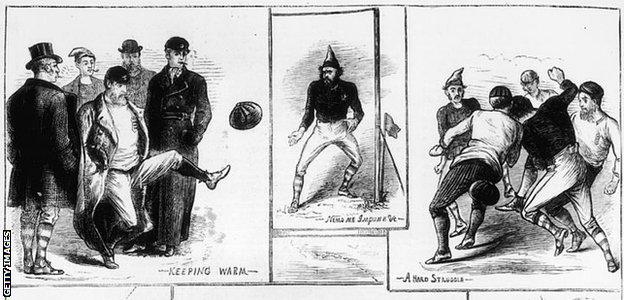
Scenes from England's first international, against Scotland in 1872, which were published in The Graphic on 14 December 1872. The original artist was a W. Ralston
For all the tears, turmoil and triumphs in England's first 999 games, it is trophies - or a lack of them - that have shaped the Three Lions' story so far.
But despite the national team having won only one World Cup since their first match in 1872, did you know they have actually collected another 60 titles along the way?
Yes, take a look back at some of the Three Lions' most memorable moments of the past 147 years and you will see they have secured a lot more silverware than you might think, including some trinkets you may never have heard of before.
As well as the glory and the goals - 3,172 in total, at both ends - there has been plenty of gloom too of course - and not just the fog that caused a game versus Czechoslovakia to be abandoned in 1975, one of only three England matches that have failed to finish.
As Gareth Southgate's side host Montenegro at Wembley on Thursday in their 1,000th senior men's international, BBC Sport takes a look back through the mists of time to try to identify the key names and numbers in England's journey, with the help of statisticians Opta and the Football Association's associate historian, Brian Beard.
Brazil are not England's only bogey team
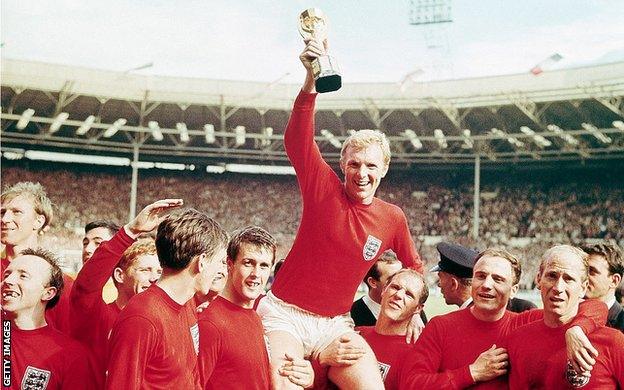
Images of England celebrating their 1966 World Cup win are among the most iconic from their 999 matches so far. The FA has invited all the surviving members of that team to Wembley on Thursday, along with all former England captains and England players with 50 or more caps
England's most common result is a 1-1 draw - they have had 102 of those - but they have won 568 of their 999 games so far, against 91 different opponents.
Of those 91 teams, 54 have never beaten England while there are six sides who have never lost to the Three Lions - Saudi Arabia (who they have played twice), Algeria, CIS (the Commonwealth of Independent States formed in 1991 to take part in Euro '92 after the Soviet Union formally ceased to exist), Ghana, Honduras and South Korea - all of whom got a draw in their only meeting to date.
Overall, counting every official game they have played, including those against teams representing the rest of Europe and the rest of the world, England have got a 100% winning record against 29 sides, and a winning ratio of more than 50% against 58 of them.
The team they have played the most without losing to is Bulgaria - recording eight wins and four draws, while they have a superior head-to-head record against 76 teams, and are behind against six - Brazil, Germany (not including games against West Germany), Italy, Netherlands, Romania and Uruguay.
Their worst win ratio against any team they have played more than twice is against Brazil - 15%, or four wins from 26 games - although they have a worse recent record against a number of sides.
In what seems an odd quirk, England have not beaten Romania in any of their past seven meetings, six of them competitive, since 1970, and are on an identical run against the Republic of Ireland, dating back to 1985.
England's worst win % comes against these teams | ||||
|---|---|---|---|---|
Team | P | W | Win % | Last win? |
Republic of Ireland | 16 | 5 | 31% | 1985 |
Italy | 27 | 8 | 30% | 2012 |
Netherlands | 22 | 6 | 27% | 2018 |
Uruguay | 11 | 3 | 27% | 2006 |
Romania | 11 | 2 | 18% | 1970 |
Brazil | 26 | 4 | 15% | 2013 |
Their worst winless run against any single team came against Sweden - they drew eight and lost four of their 12 meetings between 1979 and 2006, but they have won three of their four meetings since.
England's longest wait for a win over a current international team they have already beaten and played against since is 66 years, and counting, against Chile - they have not beaten 'La Roja' since 1953, and they have played them four times in the meantime.
But one thing has not changed much over the course of time - it is almost always better to play England at a major finals than in any other type of game, pretty much whoever you are.
Of the 47 teams they have met in 100 games at the 24 World Cup or European Championship finals they have qualified for since 1950, England have got an inferior winning ratio against 24 of them compared to their results against the same opposition if they have also met them in friendly or qualifying matches.
Although their head-to-head record is actually better against the Netherlands and Germany in finals matches - where they are dead level against each - than in other games, it is worse against a total of 18 teams when you compare it to their results elsewhere.
England's complete record | |||||||
|---|---|---|---|---|---|---|---|
Game | P | W | D | L | F | A | Win % |
Overall | 999 | 568 | 241 | 190 | 2188 | 984 | 57% |
Friendly | 422 | 230 | 103 | 89 | 908 | 476 | 55% |
Competitive | 577 | 338 | 138 | 101 | 1280 | 508 | 59% |
Qualifiers* | 218 | 147 | 49 | 22 | 522 | 131 | 67% |
Finals | 100 | 39 | 32 | 29 | 131 | 99 | 39% |
*For World Cup and European Championship | |||||||
Where in the world are England yet to win?
It all began for England at Hamilton Crescent, a cricket ground in Glasgow's west end, where they played out a goalless draw with Scotland in their first international in front of 4,000 people on 30 November 1872.
Since then they have used 54 different home grounds in 24 English towns or cities and, in neutral or away games, have played at 225 venues in 75 different countries.
Those games have been played in front of crowds ranging from an official attendance of zero when they faced Croatia behind closed doors in Rijeka in 2018, to a then-world record 149,547 that packed into Hampden Park to watch their 61st meeting with Scotland in 1937.
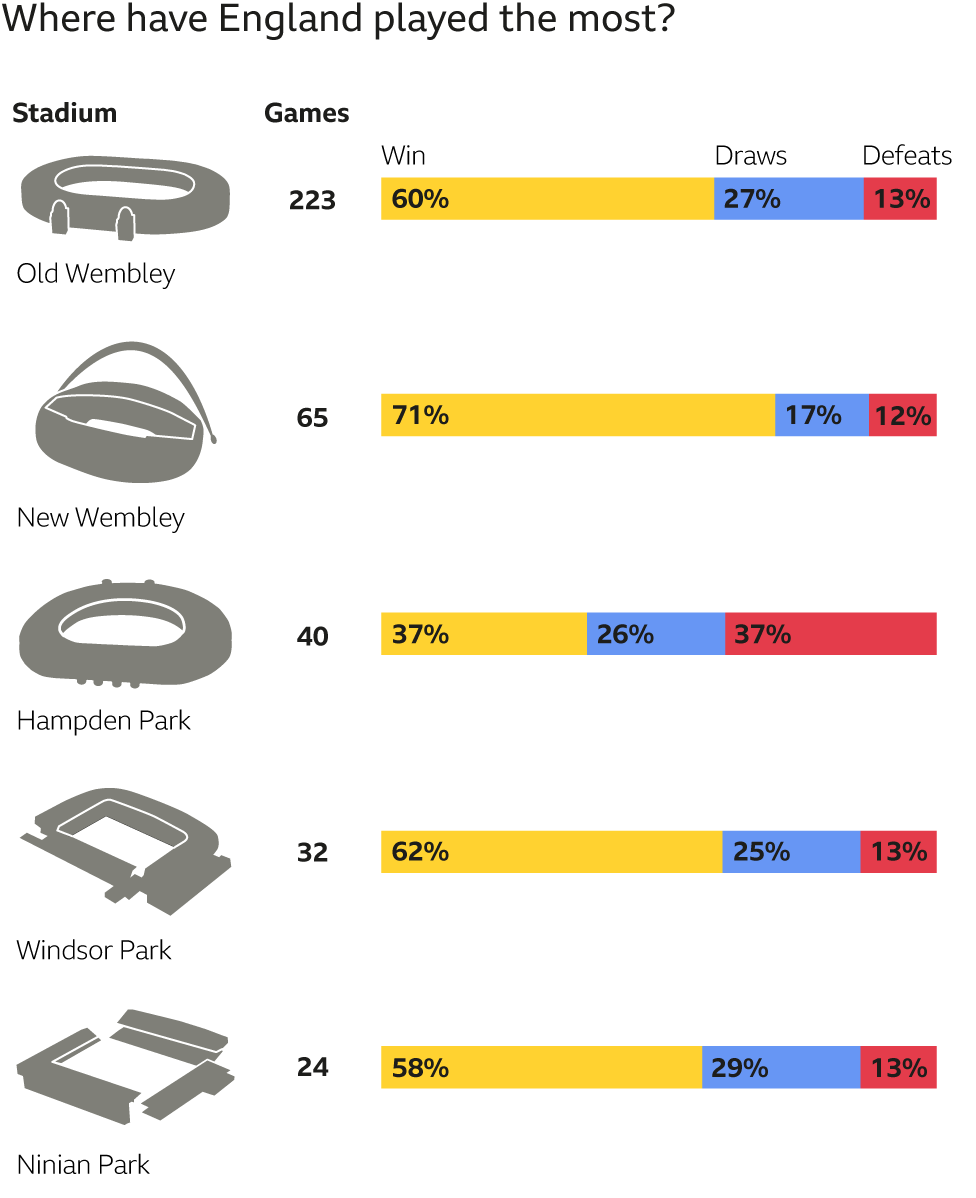
England have played the Scots 114 times, more than any other team. Unsurprisingly, they have played more away games north of the border (57 games, 20 wins) than anywhere else, but they have won the most in Wales (51 games, 33 wins).
They have won games in 69 countries so far and will get the chance to make it 70 when they play Kosovo away for the first time in Prishtina on Sunday, but are currently winless in Argentina, Iceland, Qatar, Saudi Arabia, South Korea and Tunisia out of the places they have already played.
Of the 80 current Fifa members they have played (out of a total of 210), they have a superior head-to-head record against 66, and are level with eight more.
Where England have played their 999 matches | |||||||
|---|---|---|---|---|---|---|---|
Venue | P | W | D | L | F | A | Win % |
Home | 433 | 279 | 93 | 61 | 1053 | 387 | 64.4% |
Away | 442 | 242 | 109 | 91 | 973 | 973 | 54.8% |
Neutral | 124 | 47 | 39 | 38 | 162 | 130 | 37.9% |
Predictably, their most-used venue was the old Wembley stadium, their home from 1924 to 2000, but their most successful stadium is Anfield, where they won on seven out of eight occasions, drawing the other.
On their travels, there are three grounds where England share their best record - winning four out of four matches at Ballynafeigh Park in Belfast, Stade Josy Barthel in Luxembourg and the Vasil Levski National Stadium in Sofia, where England's 999th game was held - a 6-0 win over Bulgaria in October.
Their three abandoned games all came away from home, firstly in a friendly against Argentina in Buenos Aires in 1953 when a downpour after 25 minutes left the pitch unplayable.
Heavy fog in Prague in 1975 meant a European qualifier with Czechoslovakia had to be curtailed after 17 minutes. When it was played the following night, England could see again, but lost 2-1.
And their game against the Republic of Ireland at Lansdowne Road in 1995 was stopped after 27 minutes, with the Republic leading 1-0, when England fans began rioting and throwing seats and other debris into the stand below them. The game was called off 12 minutes later.
Furthermore, the Ibrox disaster of April 1902 was the only time an England game was completed but then scrubbed from the records. A wooden stand collapsed during the first half and 25 spectators lost their lives, with another 500 injured, but the game continued because officials feared a mass panic if it was called off.
That game with Scotland finished 1-1 and a replay at Villa Park was drawn 2-2 a month later, with all proceeds going to victims.
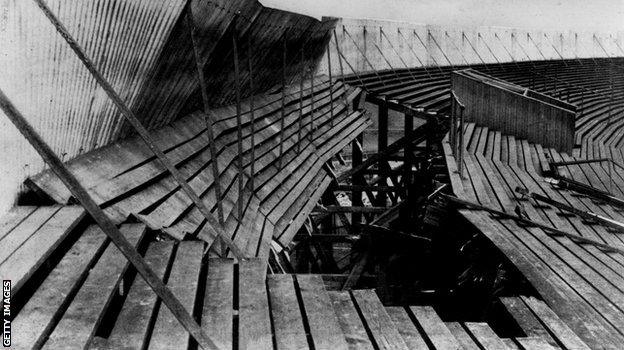
A section of the terracing that collapsed during the 1902 Ibrox disaster
Games against British or Irish opponents are relatively rare these days, and have been since the abolition of the annual British or Home Championship in 1984.
But England did not actually play anyone else home or away until their 95th game, when they beat Austria 6-1 in Vienna in June 1908, following that up with an 11-1 win against the same opponents two days later as they embarked on a tour of central Europe.
Belgium were the first foreign (defined for this purpose as non-British or Irish) team to avoid defeat, with a 2-2 draw in Antwerp in 1923 in England's 138th game, while Spain were the first to beat them.
That 4-3 loss in Madrid in 1929 ended England's run of 20 wins and one draw in games against such opposition and came in their 167th game overall. The Czech Republic were the most recent foreign side to claim their first victory when they won in Prague last month.
Who has played? The long and short of it
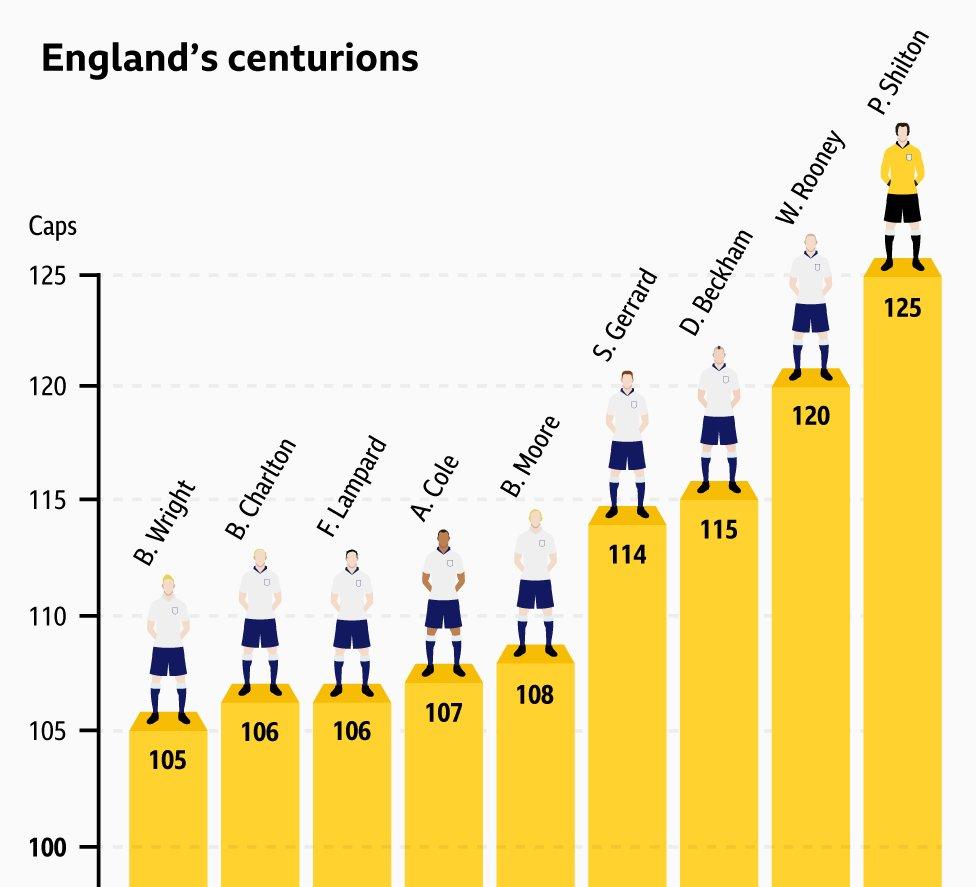
A total of 1,244 players have made senior appearances for England and, going into the match against Montenegro, every one of them has now been given their own 'legacy number' by the Football Association, chronologically recording the order of their first cap for their country.
Robert Barker of Hertfordshire Rangers, who started England's first game in goal before switching with Bill Maynard to play outfield, is number one.
Aston Villa defender Tyrone Mings, the most recent debutant after playing against Bulgaria in October, is number 1,244.
Stuart Pearce became number 999 when he started England's 625th game, a 1-1 draw with Brazil in 1987. His Nottingham Forest team-mate Neil Webb, who replaced Glenn Hoddle in the same game, was number 1,000.
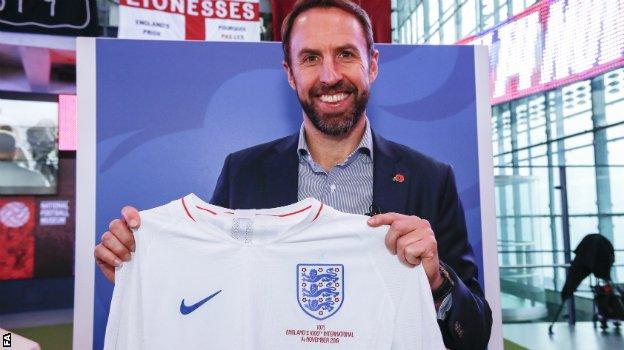
Three Lions boss Gareth Southgate, who played 57 times for his country between 1995 and 2004, is number 1,071
Only three players are known to have played for another country in an official (non-wartime match) before representing England: Robert Ernest Evans (Wales) John (or Jack) Reynolds (Ireland) and most recently Declan Rice (Republic of Ireland).
Similarly, only four players have played for England's senior side and then gone on to represent someone else - John Hawley Edwards (Wales), Jackie Sewell (Zambia), Ken Armstrong (New Zealand) and Wilfried Zaha (Ivory Coast).
There have been 122 England captains, including all nine players who have made 100 or more appearances, 356 who have made only one appearance - including the aforementioned Barker and, so far, Mings - plus 56 who have played for less than 90 minutes after being substituted either on or off in their only game.
With 125 appearances between 1970 and 1990, Peter Shilton has the most caps, while Sir Stanley Matthews had the longest career time-wise - there were 22 years and 228 days between his first cap in a 4-0 win against Wales on 29 September 1934 and his last, a 4-1 win over against Denmark on 15 May 1957.
Matthews was 42 years and 103 days old when he played in Copenhagen, also making him England's oldest ever player. The youngest is Theo Walcott, who was aged 17 years and 75 days when he played in a 3-1 win over Hungary in May 2006.
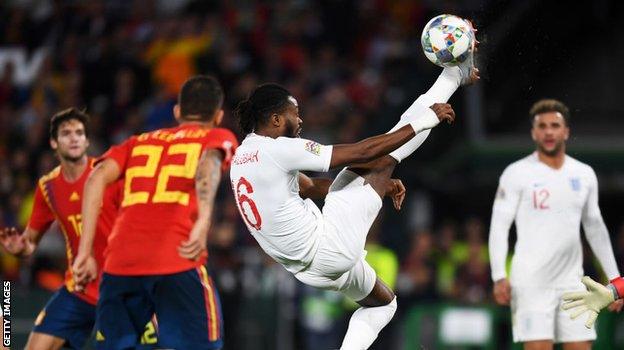
Seven minutes, one touch - this is the only time Nathaniel Chalobah has touched the ball in his brief England career to date
The award for the shortest England career is often given to Crystal Palace defender Martin Kelly, then of Liverpool, who came on in the 88th minute of a 1-0 win over Norway in 2012, but actually spent almost seven minutes on the pitch, including stoppage time.
The same applies to Watford's Nathaniel Chalobah, who was brought on in the 91st minute against Spain in 2018, but again played for seven minutes before the final whistle was blown.
Instead that dubious honour falls to West Ham defender Jim 'Tiny' Barrett, who was injured after starting against Northern Ireland in 1928 and came off after only four minutes of his only appearance.
Only 15 players have been sent off while playing for England - the first was Alan Mullery in a European Championship match against Yugoslavia in 1968.
England's win ratio is 57% overall but it plummets to 6% in those 15 games where they have been reduced to 10 men - their sole win coming against Austria in 2005 when David Beckham became their first player to receive two red cards while playing for his country.
Clubs for country - Tottenham lead the way
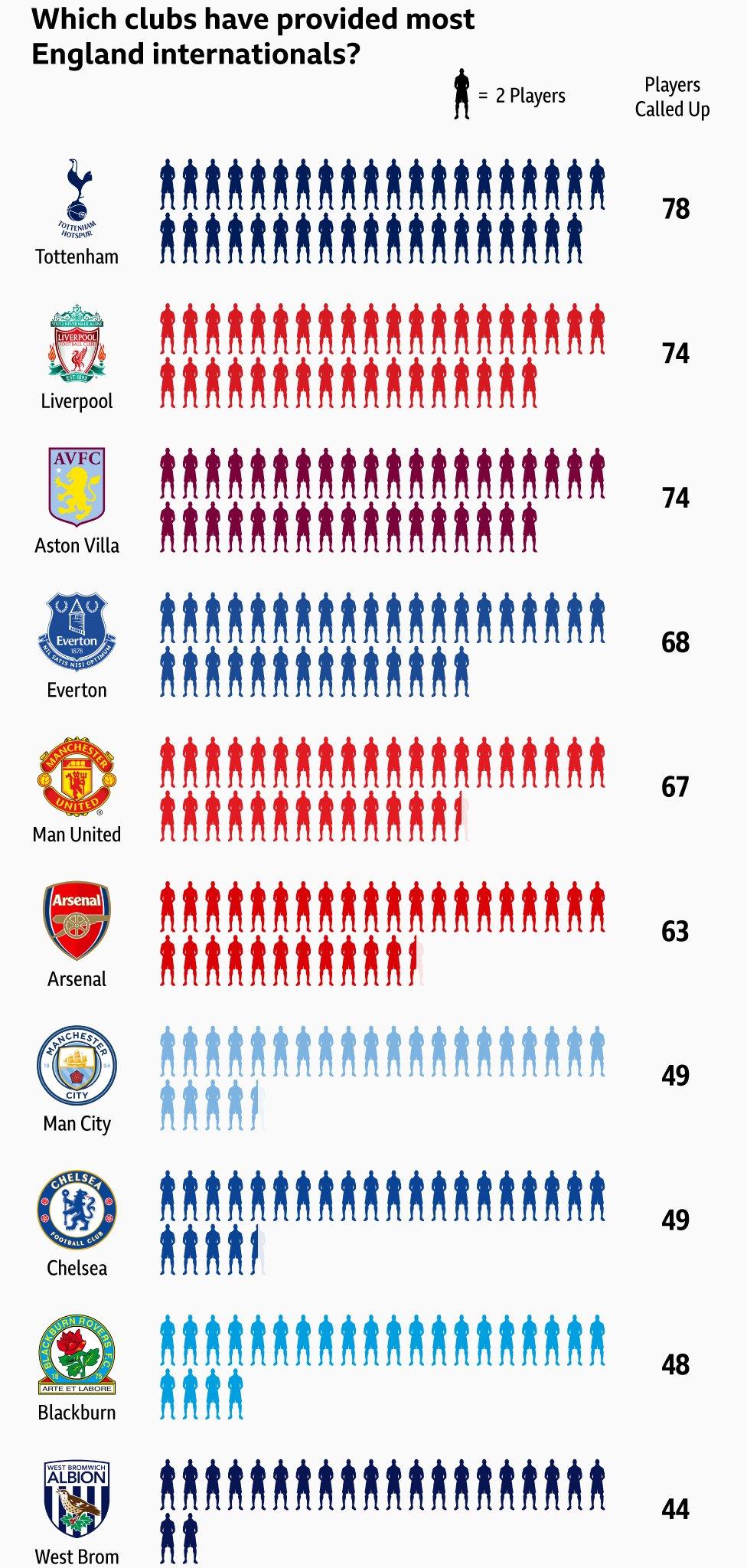
A total of 143 clubs from home and abroad have provided England players, with the most recent additions being Spain's Atletico Madrid (for Kieran Trippier's three internationals this season), DC United of the United States (Wayne Rooney, in his farewell England appearance against the US in November 2018) and Germany's Borussia Dortmund (Jadon Sancho's debut came a month earlier in October 2018). Bournemouth became the latest English club in 2018 (Lewis Cook against Azerbaijan in March, followed by Callum Wilson, also against the US in November).
Some West Ham fans like to claim they 'won' the 1966 World Cup because of the key role Hammers trio Bobby Moore, Sir Geoff Hurst and Martin Peters played in that triumph, but Tottenham are the team to have provided the most England players, with 78, and Manchester United players have won the most caps, with 1,039.
Out of the 91 Premier League or Football League clubs, 58 have supplied them - Hull City, who are 11th in the Championship, are currently the highest ranked team to have never had an England player. The now defunct Bury FC provided six.
Further afield, AC Milan and Real Madrid (with four apiece) are the foreign clubs to have had the most England internationals.
The first player to appear for England while playing for a non-British club was Gerry Hitchens in 1962, when he was at Inter Milan.
In total 27 players have won a cap while playing abroad, with Beckham making the most appearances of this kind - 55 while he was at Real, LA Galaxy or AC Milan.
Only one team - devout amateurs Corinthian FC, who never played a competitive club match - have ever supplied the entire England XI, for their 5-1 win against Wales in 1894, although many of Corinthian's players were also simultaneously registered for other, professional, clubs.
The most players from a single professional club to play in the same England teams is seven - the number of Arsenal players who appeared on their own club's home turf against Italy in 1934, in a memorably violent game that became known as the 'Battle of Highbury'.
Goals and glory - who has scored, and what have they won?
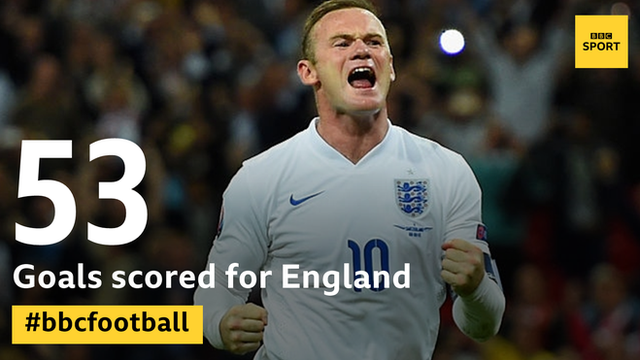
Wayne Rooney is the all-time record goalscorer for England
England have scored in 833 of their 999 games, and average the most goals per game against Luxembourg - 47 in nine games, so 5.22 per match. They have scored their most in total against Wales (247) and there are only two teams they have never managed a goal against - Algeria and Honduras.
Their biggest win - 13-0 in 1882 - and biggest competitive win - 13-2 in 1899 - both came against Ireland but England have not hit double figures against anyone since they beat the United States 10-0 in a 1964 friendly, 14 years after their shock 1-0 defeat by the same opposition at the 1950 World Cup.
Although some details from the 19th century are difficult to verify with total certainty, there are 429 different England goalscorers on record, with William Kenyon-Slaney the first against Scotland in 1873 and Jadon Sancho the most recent addition to the list, with his two goals against Kosovo in September.
What we do know for sure is that Wayne Rooney is England's youngest goalscorer - he netted against Macedonia aged 17 years and 317 days in September 2003 - and also has the most goals overall, with 53.
Four players - Howard Vaughton (against Ireland in 1882), Steve Bloomer (against Wales in 1896), Willie Hall (against Northern Ireland in 1958) and Malcolm Macdonald (against Cyprus in 1975) share the record for most in a single match, with five apiece.
The story of the 1966 World Cup
Jimmy Greaves has the most hat-tricks, with six, one ahead of Match of the Day host Gary Lineker, on five. A total of 83 players have scored trebles for England and the most famous is the one Sir Geoff Hurst scored in their 1966 World Cup final win.
When it comes to silverware, England have had only one major international triumph from 33 attempts in a World Cup or European Championship, which came in the game above.
But in the British Home Championship, which was the first international tournament to be contested and ran for 100 years from 1883-84, they came out on top or shared victory 54 times.
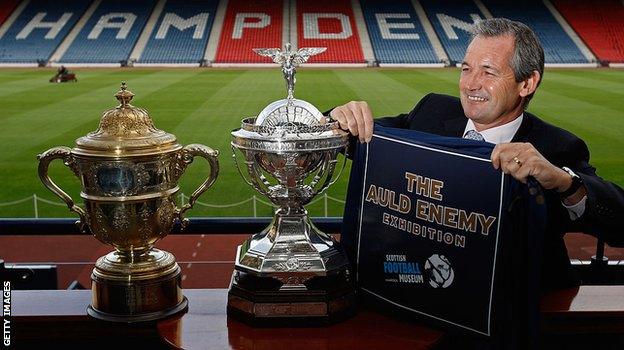
The Rous Cup (left) and British International Championship trophy (right) were reunited at Hampden Park in 2008 for the opening of an exhibition about England's historic rivalry with Scotland. The trophies are pictured with then Scotland boss George Burley
A trophy was only awarded to the winner from 1936, but England still got at least one hand on that a total of 30 times. It is now on display at the National Football Museum in Manchester.
The Home Championship was replaced by the Rous Cup in 1985, which saw England play Scotland and, latterly, a random guest South American team. It only lasted for five years, but England won it on three occasions.
More success followed in the England Challenge Cup, played against Argentina and the Soviet Union at Wembley in May 1991, the 1997 Tournoi de France where England finished above Brazil, Italy and the hosts, and also the snappily titled FA Summer Tournament, which was held at what is now known as Etihad Stadium in 2004, and saw England overcome Japan and Iceland.
Even less formally, using a boxing-style winners system going back to that first international in 1872, England have been unofficial world champions, external on 22 separate occasions, most recently when they beat Germany in June 2000 before they lost the 'title' to bogey-team Romania in their next match, going out of Euro 2000 in the process.
Who has scored against them?

There have been 984 goals scored against England but is this the best? Zlatan Ibrahimovic nets with a 30-yard bicycle kick in a 4-2 win for Sweden in November 2012
England have kept 405 clean sheets - Peter Shilton has the most, with 66 in his 125 appearances, followed by Joe Hart, with 43 in 75 games, and David Seaman with 40 in 75.
Out of the 91 teams they have played, 21 have never managed a goal against them. Scotland have scored the most in total, with 174, but Germany average the most per game, with 23 in 16 matches, or 1.43.
England's heaviest defeat came in Budapest in May 1954, when they lost 7-1 to Hungary just six months after the 'Marvellous Magyars' beat them 6-3 at Wembley.
On home turf, England's biggest loss was their 6-1 defeat against Scotland in 1881, at Kennington Oval.
At the old Wembley stadium, the Scots also claimed the biggest win - 5-1 in 1928. At the new Wembley, only one of England's eight defeats has been by more than a one-goal margin - when Chile beat them 2-0 in 2013, through two Alexis Sanchez goals.
Scotland's John McDougall was the first player to score a hat-trick against England - and also the first player to manage one in international football when he scored three times in a 7-2 win in 1878.
A total of nine players have managed three goals in one game against England - four of them Scots.
And the last word, as is so often the case, goes to Zlatan Ibrahimovic, whose stunning display for Sweden in 2012 - which included an acrobatic overhead kick - means he is the only player to have scored four against the Three Lions.
Resources used to compile this piece also include englandfootballonline.com, external and englandstats.com, external